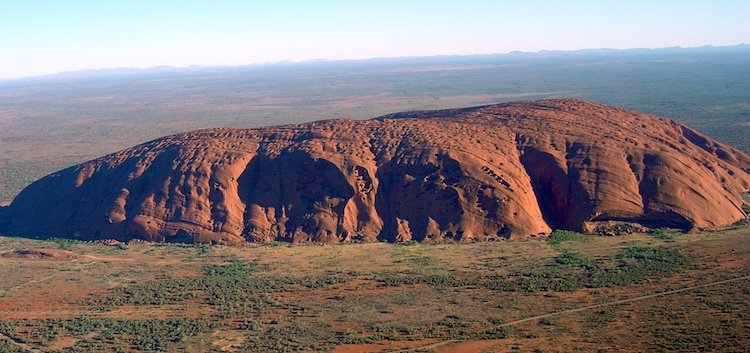By Kalinga Seneviratne
SYDNEY (IDN) – In 1967, in a historic referendum, some 92 percent of Australians voted for the original inhabitants to be recognized as “people” to be counted in the census.
Exactly 50 years later, over 250 Indigenous Australians met in a historic summit overlooking the sacred Uluru rock in Central Australia May 24-26 and called upon the Australian government to change the constitution to give them a voice in parliament and a treaty to recognize their relationship to the land.
Australian Aborigines have come a long way since the 1967 referendum that allowed them to be considered as people like the rest of the Australians. |JAPANESE
There is a growing population of Indigenous Australians who are well educated and fluent in English. Some of them are even professors, lawyers, doctors, writers, journalists and politicians. It is these leaders who are now raising the profile of Aborigines and articulating a special status for them as the original inhabitants of the vast continent.
Aboriginal people always had a spiritual link to the land and mother nature and this sovereignty was never ceded to the British crown, as the ‘Uluru Statement from the Heart’ read out at an emotional end to the summit on May 26 pointed out and called for the establishment of a First Nations Voice enshrined in the Constitution and a process leading to the signing of a treaty with its indigenous people.
Generations of White settlers have amassed great wealth exploiting the Indigenous land, especially in the north and central Australia, for its mineral resources.
Indigenous Australians had a landmark success in 1992 in reclaiming their rights to these lands. Eddie Mabo, an Indigenous Torres Straits Islander, challenged the constitution written by the British that declared the continent as “terra nullius’ (nobody’s land) and annexed it for the British crown. The historic 1992 Mabo High Court decision led to the recognition of Native Title, increasing the footprint of Aboriginal-owned land in Australia. Today, more than a third of the Australian land mass is under some form of Indigenous title.
In spite of these successes, Aborigines are the “most incarcerated people on the planet” as the Uluru Statement pointed out. Before the 1967 referendum Aboriginals were often referred to in Australian (and British) films and news reports as “savages”.
“We are not an innately criminal people,” the Uluru Statement said. “Our youth languish in detention in obscene numbers. They should be our hope for the future … these dimensions of our crisis tell plainly the structural nature of our problem. This is the torment of our powerlessness”.
Thus, the indigenous leaders want a Commission to be set up to supervise “a process of agreement-making” between governments and First Nations and truth-telling about indigenous history.
“In 1967 we were counted, in 2017 we seek to be heard” was the powerful cry conveyed by the statement. “When we have power over our destiny our children will flourish. They will walk in two worlds and their culture will be a gift to their country,” it added.
The co-chair of the Government-appointed Referendum Council, Pat Anderson, told the media that the meeting “totally rejected” an endorsement in the constitution to acknowledge Aboriginal prior settlements, an idea that is supported by both the Government and the Opposition.
“In the discussions that we’ve had in the last six months, people want treaty … they don’t want acknowledgment, they want treaty and a truth and justice commission.” She said that a working committee has been appointed at the summit to take forward these two ideas.
Fellow council member Megan Davies explained the process as acknowledging truth and justice. “This is part of the healing of the nation and coming together and having a mature nation,” she said. “There has to be proper truth-telling, in the same way as in other countries in the world.”
Ms. Anderson said that having a voice in Parliament would mean people with cultural authority and integrity will be able to have their voices heard. “We will have a say in decision making, at the moment we’re locked out. We’re powerless and voiceless in our lands,” she lamented.
Former CNN news anchor and Aboriginal journalist Stan Grant writing in the national broadcaster ABC’s website said the 1967 referendum outcome was a powerfully symbolic moment. ”It also allowed the federal parliament, for the first time, to make laws for Aborigines and Torres Strait Islanders. It was part of a wave of activism and reform. It opened the doors of opportunity to education and employment,” he noted.
But Grant warned his people that an argument for lasting political change cannot be based purely on socio-economic inequality. “First, many of the people prosecuting that case are themselves – like me – privileged, and educated. We have closed the gap,” he notes. “Australians would be entitled to ask why we need special treatment.” He argues, Indigenous Australians as the first peoples have a unique status and heritage. “But, the challenge is how Australia can incorporate that into its democracy?”
Speaking at lunch to celebrate the 1967 referendum verdict on May 27 Opposition leader Bill Shorten said that politicians owed the Aboriginal people an “open mind” on the “big question” but did not commit himself to help implement the calls in the Uluru Statement.
Prime Minister Malcolm Turnbull who is trailing in the polls leading to a national election later in the year, was more circumspect in his speech warning that constitutional changes are “very difficult”. He said that the constitution “cannot be changed by parliament (and) only the Australian people can do it”. [IDN-InDepthNews – 31 May 2017]
Image: Uluru rock in Central Australia. Indigenous Australians met in a historic summit overlooking it on May 24-26. Credit: Wikimedia Commons.




